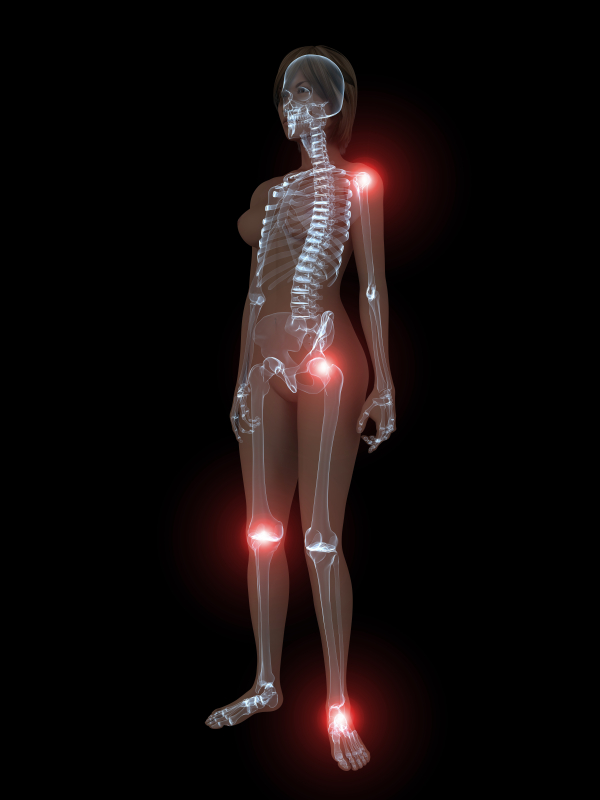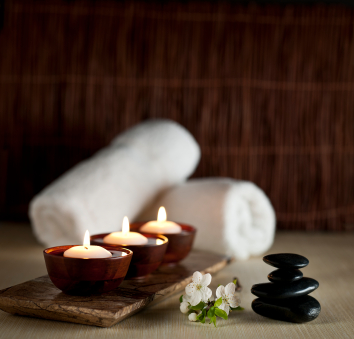Achy breaky joints
 Are you consistently achy? Have you been told that you have fibromyalgia? According to research published in Maturitas, not only are middle-aged women prone to achy muscles and joints that might be otherwise known as fibromyalgia, but, those aches and pains may actually be related to hormonal changes. Indeed, when they reanalyzed information collected from over 8,300 women between the ages of 40 and 59, they learned that muscle and joint aches during this time period were significantly related to menopausal symptoms — not only did more than half of the women (63%) suffer from muscle and joint achiness, but, it appeared to double in prevalance in women ages 55 to 59 compared to their younger (40 to 44 year old) peers. Moreover, it tripled in women who were five years into menopause compared to the same group of women.
Are you consistently achy? Have you been told that you have fibromyalgia? According to research published in Maturitas, not only are middle-aged women prone to achy muscles and joints that might be otherwise known as fibromyalgia, but, those aches and pains may actually be related to hormonal changes. Indeed, when they reanalyzed information collected from over 8,300 women between the ages of 40 and 59, they learned that muscle and joint aches during this time period were significantly related to menopausal symptoms — not only did more than half of the women (63%) suffer from muscle and joint achiness, but, it appeared to double in prevalance in women ages 55 to 59 compared to their younger (40 to 44 year old) peers. Moreover, it tripled in women who were five years into menopause compared to the same group of women.
About 16% of these women said that their symptoms were severe or very severe. And importantly, these women tended to display so-called epidemiological characteristics, things like lower socioeconomic status (and by default, less likely to have the means to pay for better healthcare) or a history of psychiatric care. Regardless, there also appeared to be a direct correlation between feeling less healthy and having severe muscle and joint aches. And, women who had surgical menopause carried an even higher risk of presenting with worse joint symptoms.
Study findings also showed that the more intense menopause symptoms were, the more severe muscle and joint aches appeared to be; up to 60% of women with severe vasomotor symptoms also reported severe to very severe aches and pains.
It is possible that the central nervous system has some sort of role, as it impacts both symptoms and joint and muscle pains. Another commonality is that among women with fibromyalgia, symptoms like weakness, anxiety and insomnia — also seen during menopause — are present.
So where are the holes? Because of the study design, there is no cause and effect conclusion at play; in other words, researchers can’t unequivocally say that menopause causes aches and pains. Moreover, the tools used to evaluate muscle and joint pain are actually the same as those relied on to evaluate menopausal symptoms, which means that accuracy may come into question. Still, what they did learn is that hormone therapy reversed or lessened pain severity, meaning that menopause does appear to play some sort of role.
Meanwhile, if you are feeling especially achy and you are in the throes of menopause, it is very possible it’s not in your head. Talk to your practitioner, And consider mind-body strategies such as meditation, QiGong and yoga, which have been correlated with reductions in pain.
Read MoreWednesday Bubble: cultivate your inner lotus
[Photo credit: Priya Ramesh, Coorg India. 2013]
On Monday, I shared information about the benefits of mindful meditation and being present and how they positive affected stress and the hormone cortisol. I cannot stress the importance of incorporating stress busters into your life; not only is your mental health at stake but the risks to your overall health are numerous. If meditation is not your thing, there are other strategies to consider, including yoga, Tai Chi, acupuncture and deep breathing. There is also Qigong.
Qigong is a Chinese practice harkening back more than 4,000 years. In many ways, it incorporates the best of several strategies, including alignment of movement and breath, meditation and yoga (strength, flexibility). My friend and colleague, Jeri Hemerlein, teaches a female-specific form of Qigong at the Yoga Center in Columbia, MD. Known as Radiant Lotus Qigong, Jeri describes it as a flowing form combining ancient Chinese and Tibetan techniques to health issues unique to women. Radiant Lotus Qigong uses the lotus flower as a metaphor for female resilience and flexibility. The movements open the body’s energy, gently stretching and releasing tension from muscles, joints and spine while waking up the immune system. The form seeks to enhance the whole body health of women from menstruation to post menopause, while supporting the Divine Feminine nature and helping the woman return to an innate state of loving compassion, wisdom and inner strength during times of stress and intense emotions. The form was created by Advance Qigong practitioner Daisy Lee, who developed it after studying with various Qigong teachers who were able to successfully address women-specific issues through original and individual forms.
If you visit Daisy’s website, you can learn more. Or, if you are local to the DC/MD area, you can attend a workshop that I am blessed to be giving with Jeri on April 23, 2013 at 6:30 pm in Annapolis. ‘Cultivate Your Inner Lotus: Menopause, Stress & Qigong” aims to help you gain a better understanding of stress during menopause and provide you with specific techniques to address it on your own. I hope that you’ll consider joining us.
Cultivating your inner lotus may be the best thing you can do for yourself.
Read More
Every breath you take
We know that deep, focused breathing is a great stress buster, easy to practice and even easier to learn. However, it looks as though the breath you exhale may also be a harbinger of the very stress that you are letting go of. In fact, UK researchers have discovered that the breath has certain markers that may allow it to become a stress detective, if you will.
These markers are a mouthful, literally! Known as 2-methylpentadecane and indole, these very compounds appeared to increase following a stress exercise in 22 young adults who offered their breath for science! Using a scientific technique to analyze breath samples when the volunteers were calm and then stressed, and also measuring heart rates and blood pressures, the researchers were able to identify six compounds in breath related to stress but only the two mentioned above increased. What’s more, the stress response — faster breath and increased heart rate — appeared to change the normal composition of the breath.
I never thought that I’d be writing about breath profiling on this blog but it fascinating. Clearly, changes in breathing patterns have effects — either positive or negative — in the body. But would it be possible to develop a simple test to help suss out underlying stress, the type that over time, can lead to burnout, depression and of course, illness?
Only time will tell and larger studies are needed. But the very breath you take might be equal to the stress you make.
Meanwhile? Inhale. Hold. Release. Every breath you take matters.
Read MoreMake ‘Em Laugh
“Don’t you know everyone wants to laugh?”
Truly, is there anything better than a deep, uncontrollable, tear streaming down your face, belly aching laugh?
However, besides the sheer joy that laughter brings, did you know that it also lowers stress and benefits the heart and boosts immunity? Laughter reduces tension and anxiety, raises self esteem, hope, energy, enhances memory and creativity, improves interpersonal interactions, builds unity and solidarity. Laughter is essential to happiness and overall wellbeing. Laughter positively affects our muscles, our breathing, our hormones and our nervous systems. In fact, at its core, laughter incorporates the entire mind-body construct. Moreover, although laughter is contagious, it has few side effects.
Yet, does simulated laughter yield the same benefits?
In case you are wondering what I’m referring to, simulated laughter is the foundation of laughter yoga, a worldwide movement that focuses on laughter exercises, including:
- Pantomime followed by laughter
- Physical greetings followed by laughter
- Dancing and singing (and laughing exercises)
- Laughing alone
- Laughing meditations
Simulated laughter works in large groups, in pairs and can be playful or exaggerated. The theory underlying simulated laughter is that while the mind can distinguish between spontaneous and simulated laughter, the body cannot. Importantly, research bears this out, and a number of scientifically controlled studies have shown that simulated laughter can lead to reductions in blood pressure, improvements in stress hormone levels, positively affect depression and insomnia and even improve anxiety in chronic pain patients. Regular simulated laughter sessions can be used as effective coping strategies and benefit workplace morale. Even smiling can yield positive effect.
Can anyone do it? Well, clearly, anyone can laugh. But simulated laughter is a technique that is most effective when it’s learned, practiced and developed. Not surprisingly, laughter yoga clubs have popped up across the nation, touting messages of helping people gain a happiness advantage. And data provide sufficient evidence that ‘laughter has positive, quantifiable physiological and psychological effects on certain aspects of health.”
Make em laugh? You bet:
Ah ha ha ha ha ha há
Ah ha ha ha ha ha
Ah ha ha ha ha ha ha
Ah ha ha ha ha ha ha ha ha
Make ’em laugh, ah ah!
Make ’em laugh, ah ah!
Make ’em laugh, ah ah!
Make ’em laugh
Make ’em laugh
Make ’em laugh!
-Donald O’Connor, Singin’ in the Rain
Read MoreIs a spa retreat the key to your soul’s estate?
(S)he enjoys true leisure who has time to improve his soul’s estate. – Henry David Thoreau
If you are anything like me, you’ve worked yourself to the nth degree and are in need of rejuvenation. After all, your soul’s estate is only as valuable as its upkeep, right? However, is there any proven benefits to a spa retreat beyond that incredible boost of endorphins that feed an overall sense of wellbeing?
Evidently, there really is! In fact, contrary to what many believe, newly-published research in Integrative Medicine suggests that the combination of caloric restriction, colonic therapy, meditation and yoga may provide the body with actual physiological benefits beyond the feeling of wellness. Mind you, certain practices like caloric restriction can be downright dangerous if not effectively carried out, reducing much needed vitamins and minerals, resulting in a loss of lean body mass and even taxing the heart. Colonic hydrotherapy, i.e. removing toxins from the intestines, has likewise been questioned, namely because there are few data to support claims of therapeutic benefit and without proper guidance, may result in nausea, vomiting, dehydration and electrolyte imbalance.
However, in this very small study of 15 healthy women and men, a one-week, intensive spa program that focused on three main areas – calories, toxins and stress management — yielded some surprising results. Roughly three to four days before a week at the spa, the participants switched out their normal eating habits for fruit, raw and steamed veggies, salads, juices and herbal teas, 2 tablespoon of olive oil at bedtime, 8 oz of prune juice every morning and laxative teas at night. They were also asked to avoid potatoes, bananas, all grains, pasta, meat, dairy, processed foods, caffeine and alcohol.
At the spa, all received at least four colonic treatments and did 800 calorie juice-fast cleanses (all herbal teas, veg/fruit juices, probiotics, digestive enzymes, herbal laxatives, olive oil, vegetarian liquid protein supplements, vegetarian soup and water with lemon). They also participated in daily structured meditation and yoga programs as well as personal meditation to boost deep breathing, heightened awareness and calm.
The findings? Clearly, all participants dropped weight, which is to be well expected from caloric restriction; this weight loss averaged about 7 pounds. Likewise, there was expected decrease in blood pressure. Blood fat levels, namely total cholesterol, also benefitted, and levels of mercury declined in some participants, which supports the hypothesis that this type of program can help clear the body of certain toxins. Not surprisingly, the researchers also noted a significant decrease in stress, depression and anxiety and saw improvements in anger levels, tension and fatigue. Spirituality scores also improved, probably as a result of meditation and the group appeared to be more intensely unified than before the spa visit.
Researchers say that while the study is quite small, it appears that intensive spa programs may have some real benefits. One thing to note is that the participants experienced changes in sodium and chloride levels. This indicates that some of these interventions do affect electrolyte levels and therefore, can be risky in people who are predisposed to imbalances or on certain medications like diuretics. The researchers also recommend that before participating in ‘extreme spa,’ that you have a complete physical to insure that your body is up to the task.
Extreme spa or gentle spa that focuses on health, balance and internal (re)connection. All may hold the key to estate management. Your soul will thank you!
Read More







